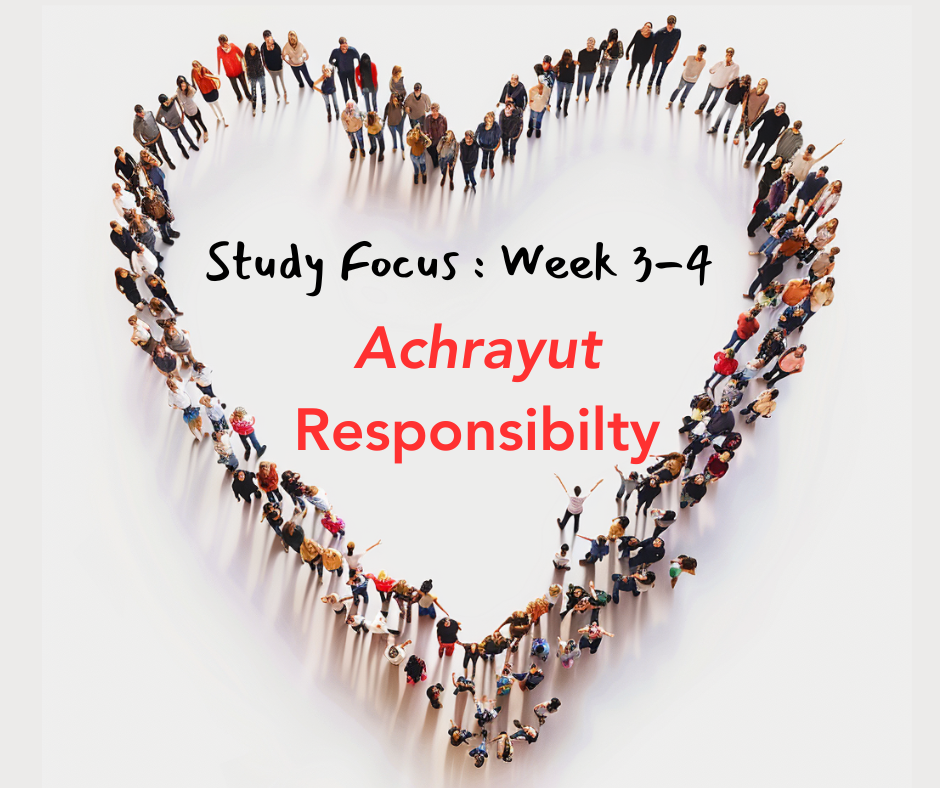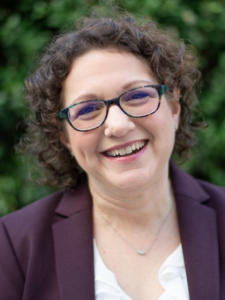
Omer Essay WEEK #4: Upholding Shared Responsibility
It can be difficult not to despair at the state of the world. Extremism in politics and people has a way of polarizing us and pushing us to separate tents, into “us” and “them,” and it is harder and harder to imagine that we could ever come together in resolution. And yet, the uniqueness of Judaism and the source of its moral power lie in our commitment to the Jewish family and to all the families of the earth at one and the same time. Ahavat ha’briot – love of Creation – is balanced with Ahavat Yisrael – love for the Jewish people. It is not one or the other. It is a statement to hold both.
Jewish unity is a source of hope, and beyond the horrors of war and antisemitism, rising extremism and terrorism that is placing Jewish lives in jeopardy, we have also uncovered and revealed a strong sense of Jewish unity. To be the Jewish people, a family of one nation, we must understand the significance of being responsible for one another. A mutual commitment is required of us: we each undertake the common goal of strengthening the nationhood of the Jewish people. Each of us has committed to taking advantage of this Omer Challenge to transform ourselves, and so we must keep in mind that our sacred toiling matters most when it is aligned with the collective in mind.
* * *
Many individuals make the assumption that their perception of the world is the objective truth, thus leading them to believe that everyone else should see the world the way they do. However, when the self is understood as relational and interdependent, then it bleeds over into the other, and the other into the self. Understanding the self as a locus of consciousness within the matrix of relationships, we no longer need a conflict to understand a problem. We can simply look for the imbalance in relationships.
If you choose to talk only to those who share your world view, there’s only so far you can go with this conversation. There is so much more to learn from people who have different viewpoints than our own. Can we be a truly unified community without being uniformed in our approach to Judaism? Yes, we can - when we emphasize connections rather than divisions. This demands deep understanding, personal accountability, and moral responsibility.
Acceptance of otherness and cooperation within difference are the major two components to a healthy and whole/shalem community. Compassion is the experience of identifying with somebody else and knowing what it’s like to be them. It comes from asking “What is it like to be you? How did you come to be who you are?” It involves actively engaging with the differences that make individuals unique.
And so, Judaism teaches us to seek first to understand, then to be understood. Before judging other Jews, set the intention to understand them and their perspectives through empathic, attentive listening.
“The true wise person is one who learns from every situation and every person. One learns everything there is to possibly learn from those around them. Not only the things that fall within one’s present purview of interests or strengths. One is open to everything that happens around them - every occurrence and every event. One’s world is full of opportunity. It is a virtual symphony of knowledge, the topics and issues constantly changing. Everything around you, every experience, provides a constant source of “material” for your spiritual life.”
[Based on Alter of Kelm, “Chochma U’Mussar,” volume 2, ch. 113]
Most people listen with the intent to reply, not to understand. They are either speaking or preparing their agenda to speak. This does not invite the possibility to truly hear someone, but actually blocks the listener’s ability to hear the other person.
* * *
I have noticed a shift in American Jewish life away from denominationalism and toward more inclusivity and diversity. It’s possible to respect varied forms of Jewish expression and spiritual practice. It’s possible to visit other congregations, to learn from each other, and to open our minds to alternative viewpoints. It is possible for us to go from inclusion to respect and from respect to the celebration of difference. It’s possible to expect and respect difference and diversity within our Jewishness.
We can divide ourselves into enemy and friend, or we could come to the realization that we belong to the same people. When we consider the Jewish community to be one sacred cluster, we give honor to God’s creations with humility and faith, listening to one another and taking mutual responsibility for one another.
While the unity around these core values persists, there is still room for diversity in approach. We are strengthened when the many individual voices come together in song. Our unique approaches play a part in the development of a larger and unified whole.
We have been counting each day of the Omer together, as one Jewish people. We have also been counting the number of days that Israel’s hostages are not free…
What does it mean to you to mark each day? What does it mean that (almost) every Jewish individual and family has celebrated in some way or form a Pesach seder, or lights the Chanukah candles, or stands before the gates of divine judgement on Kol Nidre?
In this time of Omer, we have a responsibility to count each day and to make each day count.
Your destination can be anywhere and anything. Please email us at helaine@mussarinstitute.org and share your goal.
 Blessings for the journey,
Blessings for the journey,
Naomi
Naomi Wittlin attributes her renewed interest in Jewish learning to studying Mussar with The Mussar Institute for almost ten years. She is a Manchim Program graduate, completed the Advanced Facilitator cohort with Julie Dean, and co-facilitates a va’ad in Houston, TX. She traveled to Israel four years ago with TMI. Naomi recently completed her Masters in Jewish Studies at Gratz College and is currently a rabbinical student at the Academy for Jewish Religion in New York. She is a writer, mother, and mixed-media artist and incorporates themes of Jewish texts into her artwork. She has an amazing 15-year-old daughter and a supportive husband of 22 years. She is a dedicated student and facilitator of Mussar whose passion is watching people grow toward their spiritual potential and make lasting transformations in their lives. You can find her spiritual reflections, artwork, and monthly book reviews at poeticaperture.com.
Questions for Reflection:
1. How does the notion of ‘upholding shared responsibility’ resonate with you after reading this essay? What is one small step that you can take as part of your Omer challenge to ‘uphold your shared responsibility’ in a way that is authentic to you?
2. How do you see yourself becoming more accepting of diversity and differences amidst the Jewish people? Where are you challenged with this? How can your Mussar practice guide you?
3. How can you improve your ‘attentive listening’ skills as a means of letting go of assumptions and agendas? How do you see this as part of your moral responsibility commitment?

Special Dedication:
We have had a dynamic and thriving Mussar community at Temple Israel in West Palm Beach Florida for over 15 years. One of the Middot we studied this past year was Kavod and we were inspired by Alan Morinis as he wrote in Mussar in Action:
"Torah sets each of us on the path to be a sanctifier, because it gives the instruction to be holy in the plural (kedoshim tihiyu). I believe that when most of us hear that injunction, it resonates deeply within us, as if it is awakening a profound truth woven into our very being. If you embrace the role of sanctifier, you find opportunities everywhere you look. And when you honor in this way, the world—including you and everything and everybody you honor—becomes a holier place."
We honor Rabbi Emeritus Howard Shapiro in sponsoring this week of the Omer Challenge, who brought Mussar to Temple Israel. Embodying the role of the sanctifier, Rabbi Shapiro continues to be an inspiration to our group, our synagogue and the community at large.
